You Can t Go Home Again Tropes
"And they lived happily ever subsequently." This line lone should give y'all an idea that this article is talking near the romance genre. And while a Happily E'er Afterward is really a not-optional feature of the genre, authors tin can choose to incorporate romance tropes to provide readers with instantly recognizable markers that assist them immediately relate to the dearest story at paw.
Tropes are plot devices, characters, images, or themes that are incorporated so frequently in a genre that they're seen as conventional. "Trope" is often seen as a dirty give-and-take, because it feels interchangeable with the word "cliché." And while authors shouldn't simply indistinguishable story formulas that have proven popular, incorporating tropes can provide a betoken to readers about what kind of book they're dealing with. At their cadre, tropes are really just things that are familiar. And people enjoy the familiar.
So if you're an aspiring romance author, do yourself a favor by getting acquainted with the pop romance tropes out in that location. It volition help you get an idea of what romance readers already like, and will help you write stories that feel refreshing and new. You can start with this listing!
11 of the most popular romance tropes
one) The 'Trapped in an Lift'
This trope has a number of pop variations: the "have to spend a night in a cabin," the "stuck in a car in a blizzard," the "trapped overnight in the part," etc. The indicate is 2 people who likely barely know each other (or aren't very fond of one another) are forced together in a relatively enclosed infinite. They have to rely one on another to get through the experience, come to appreciate i another, and eventually fall in beloved.
(Bonus points if the place where they're staying has just one bed which they begrudgingly concord to share!)
Example: In the 1934 romantic comedy film, Information technology Happened One Night (you probably know it from this hitchhiking scene), Clark Gable and Claudette Colbert are forced to share a hotel room with twin beds (which was just equally scandalous as sharing the same bed back in the solar day). They hang a sail between the two beds to create privacy, but the dark remains intimate nevertheless.
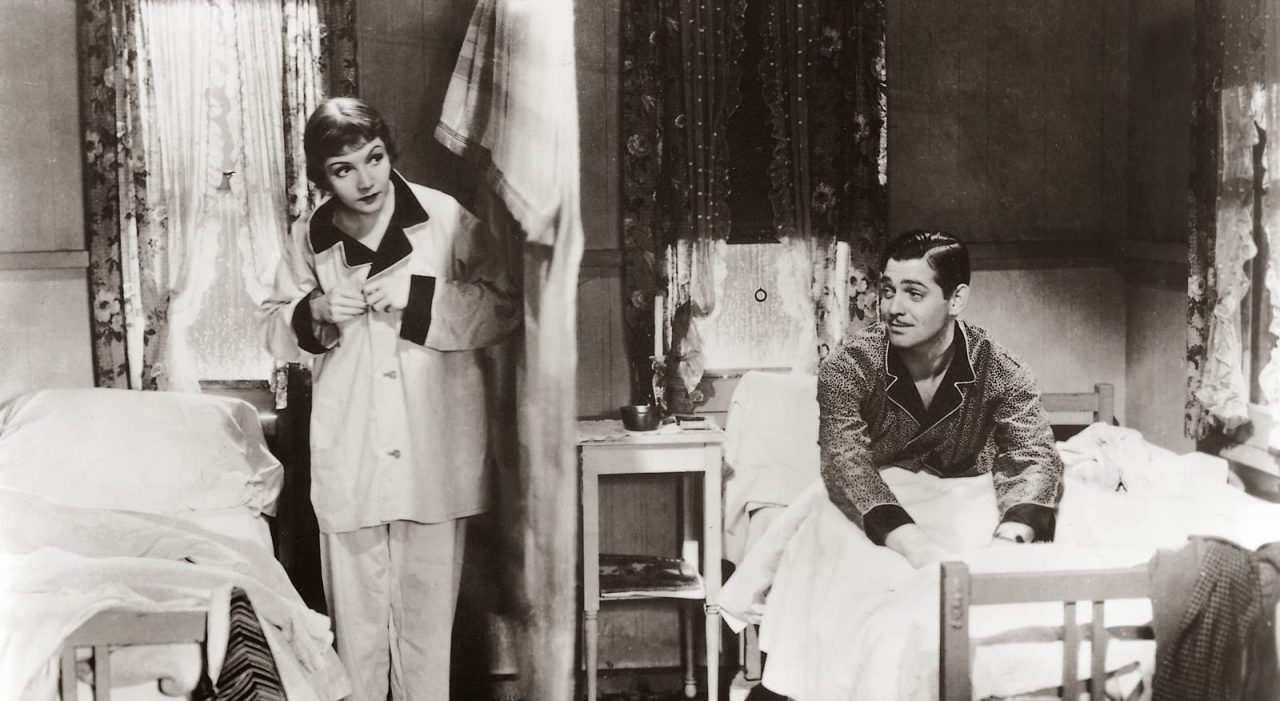
two) The 'Love Triangle'
Charlie and Jim beloved Diane. Or maybe Diane loves Jim, and Jim loves Charlie, and Charlie loves Diane. Either fashion, iii's a oversupply in this romance trope, and someone, if not everyone, is going to end upwardly getting injure.
Example: In The Hunger Games, Peeta and Gale both love Katniss. (Bonus points to Suzanne Collins for incorporating the Fake Human relationship when Katniss and Peeta pretend to be married).
🎵
Tell the states about your book, and we'll give you a writing playlist
It'll only have a minute!
three) The 'Fake Relationship'
For one reason or some other, two people must pretend to be in a relationship. This existent-life exercise in method acting eventually becomes more real than either of them had expected and they fall in love. Typically, once their "arrangements" ends, they will function ways, thinking there is no hope for a real relationship to bloom… until one — or both — of them declare their true feelings.
Example: In To All the Boys I've Loved Before, loftier-schooler Lara Jean is mortified to learn that her mash notes accept been delivered to the boys she's crushed on over the years. When ane of these crushes confronts her about his letter, she deflects his questions by lying about being in a relationship with a young man classmate. Peter, himself going through a breakup, agrees to become forth with the ruse for Lara's sake.
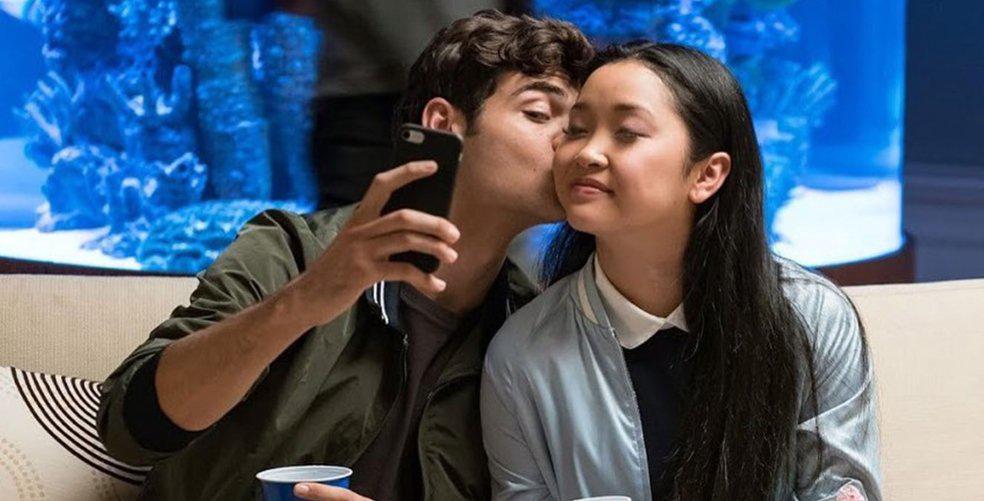
Check out this postal service on all the unlike subgenres in romance!
4) The 'Enemies Become Lovers'
We'll get to the whole "love at first sight" trope a little afterwards, only first let'southward talk almost hate at offset sight. Two characters come across and immediately dislike each other, perhaps due to opposing views or often because of a misunderstanding. Through the course of the story, this dislike volition become more entrenched until some sort of upshot (perhaps a Trapped in an Elevator state of affairs) volition force them to look at one another in a different light. The characters will likely endeavour to deny their softening feelings until they become incommunicable to deny.
Example: Unsurprisingly, this trope features in Sally Thorne's novel The Antisocial Game. Lucy and Joshua, both executive assistants to co-CEOs of a publishing visitor, tin can't stand one another. When they compete for the same promotion, the tension between them reaches humid betoken. Which is also when they kickoff to realize that all that tension is masking another kind of feeling...
5) The 'Belated Love Epiphany'
As Joni Mitchell sings in "Big Yellow Taxi" — "Don't it always seem to go, that you don't know what yous've got 'til information technology's gone?" That'due south the whole idea backside the popular Belated Love Epiphany: the protagonist loses, or is at risk of losing, someone they disregarded. And only in their absence does the protagonist brainstorm to realize what the other grapheme meant to them.
(Bonus points: the epiphany leads the protagonist to run through an airport, train station, or similar in guild to cease the other character leaving by declaring their love).
Example: In My Fair Lady, Professor Higgins makes a bet that he tin turn Eliza Doolittle "into a lady" with half dozen months of elocution lessons. He wins the bet but loses Eliza, having only regarded her as a means to an end. Just once she's gone does he realize that he had "grown accepted to her face."
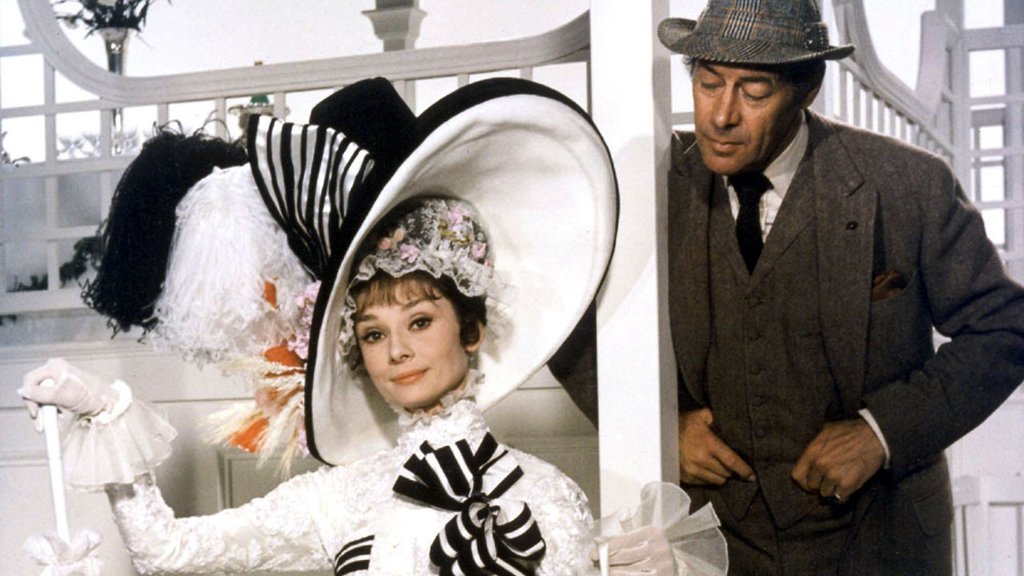
6) The 'Friends to Lovers'
Two childhood friends go through the trials and tribulations of boyhood together, counting on one another. Fast forward to their developed lives: they oasis't spoken in decades but remember of 1 another every then often. Brought back together for some reason, they reignite their friendship. For a while, they may see each other as just friends, simply ultimately realize that — despite all the years apart — they were meant to be together.
Example: Jane Austen'due south Mansfield Park begins with young Fanny going to live with her wealthy aunt and uncle. In one case there, she becomes best friends with her cousin Edmund. As they abound up together, Fanny falls in dearest with Edmund; a fact she fiercely conceals, every bit Edmund makes information technology articulate he does not feel the aforementioned. Somewhen, Fanny is sent abroad and Edmund very nearly marries the incorrect woman. Years after, the two are reunited, and Edmund sees what was in front end of him all along (making this case also a Belated Love Epiphany).
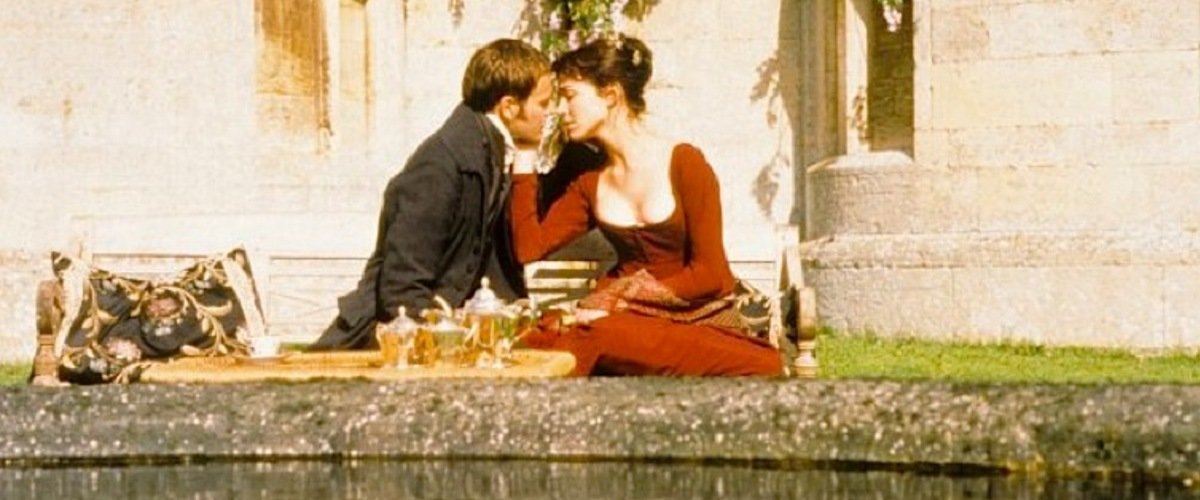
vii) The 'I'm Actually a Cloak-and-dagger Royal/Billionaire'
Members of the monarchy — they're just like united states of america, eh! Or at least, that's the example with this romance trope. A royal figure or billionaire is tired of existence in the public light. They just desire to be treated as a normal person for a while, so they adopt a disguise or go somewhere they won't be recognized. So they meet someone who doesn't give them the preferential treatment they're used to. In fact, this new person likely treats them with casual disregard. This intrigues the hugger-mugger royal/billionaire, who looks to get to know the other character better. The two course a relationship which blows upwards when the unsuspecting graphic symbol finds out their love'south true identity, and feels betrayed by the lie. But then they go over information technology, one fashion or some other, and the 2 cease up together.
Instance: Played to a T in The Prince and Me. Edvard is Kingdom of denmark'south Crown Prince. When he sees a commercial showing American coeds lifting upwards their shirts for the camera, Edvard decides he wants to flee his life of royal responsibilities to attend the University of Wisconsin college (mannerly). In that location he meets Paige, a pre-med student who, initially, is not a fan of Edvard. The two eventually develop a relationship at the coffee shop they both work at, and romance ensues. When Paige discovers Edvard's truthful identity, she leaves him. Merely the two eventually reconcile and end upwardly pledging to be together.
viii) The 'Destined To Be Together'
While a lot of these examples of romance tropes have to do with two people slowly realizing their feelings for one another, the Destined To Be Together involves couples who know right from the start that they are in love. Their intense immediate bond is what maintains their resolve that they're meant to be together while the universe, typically, conspires to separate them.
Example: In The Princess Helpmate, Westley is a farmhand to Buttercup and her family. Equally children, they fall in love. Westley goes off in pursuit of riches so that he can marry Buttercup and provide for her. When Buttercup receives news that leads her to believe Westley has died, she agrees to a proposal past Prince Humperdink. But Westley is alive and well, and comes back for Buttercup, leading the pair on a journeying to fight for their i true dearest.

9) The '2d Chance at Love'
This romance trope can play out in a number of means. Perhaps a couple breaks up only to reunite decades later. Perchance they have been securely hurt in the by, and have spent years avoiding any kind of romantic human relationship. At present they will meet and learn to give love some other chance. This is a hopeful trope that readers enjoy because it enforces the theme that "it's never too tardily."
🖊️
Which genre (or subgenre) am I writing?
Find out which genre your book belongs to. It only takes a minute!
Example: In Nora Roberts' Birthright, Callie is an archaeologist called to work at a site where 5-thousand yr-old human bones have been constitute. As is her ex-hubby Jake, with whom she had a passionate marriage that somewhen disintegrated due to lack of communication and trust. Now, forced to work together again, they are confronted past their old problems and are forced to admit that they still beloved one another.
x) The 'Forbidden Beloved'
The forbidden fruit tastes the sweetest, right? This romance trope involves two people who are desperately in love but are forced apart — either by their families, their civilisation, or geographical distance. Whatever the case, something is preventing them from being together. You could as well call this the "Star-Crossed Lovers" trope, as the term "star-crossed" means that destiny has ruled something cannot be.
Instance: Because the trope could also exist chosen the "Romeo and Juliet" for how much the two are associated, we'll go with a different case. In The Notebook, Noah and Allie fall in love from the beginning when they see as teenagers. After a summer solidifying their soulmate condition, Allie's family moves away, separating the two. Her parents do not believe working form Noah is the correct fit for upper class Allie, so her mother hides all the letters Noah sends, breaking Allie's center and forcing her to motility on. Until… well, we all remember the kiss that won MTV's All-time Kiss award, right? (This is as well an example of a 'Second Chance at Love' trope).
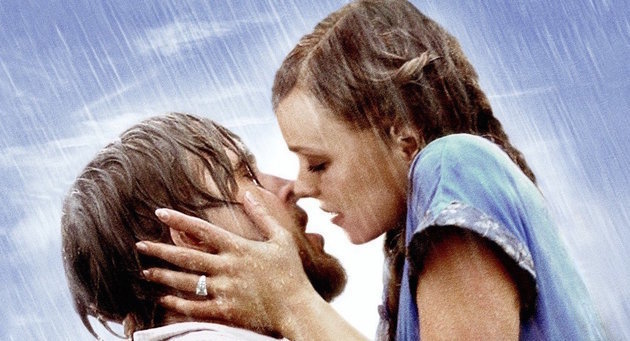
11) The 'You've Changed'
Instead of following two people on their path to honey love, this kind of story starts out with 2 people who are already in love, and likely married or in a committed human relationship. 1 of the people in the pair ends up getting a new task or falling in with a new crowd of friends that changes them in some way, perhaps by altering their values or priorities. Maybe their new situation is simply eating up all their fourth dimension so that they are no longer equally dedicated to the human relationship. Their significant other will make their feelings known, and eventually leave, when the relationship continues to disintegrate. This will cause the protagonist to realize that despite their high-flying career or flashy friends, their life is empty without their meaning other, and they go back to their onetime ways, eventually convincing the other person to give them another chance.
Example: In the movie accommodation of Lauren Weisberger'due south The Devil Wears Prada, Andrea gets a chore as a personal assistant to a powerful style mag editor. She sees this chore equally a stepping stone to a full-fledged career as a journalist, and therefore gives information technology everything she's got. The job begins to consume her and change her values, until her boyfriend Alex no longer recognizes her and he leaves. Only when she quits her job and gets back in touch with her roots do they end upward back together.
How to brand romance tropes feel new
Alright, at present you've got an thought of the common conventions of romance, you lot tin get started on putting your own spin on them. If you lot need a little extra help animate new life into classic romance tropes, y'all tin cheque out this detailed section of our post on fantasy tropes that walks authors through three trope-bending techniques. Here's two examples:
- Deconstruction. Embrace a trope in gild to encourage give-and-take near that trope. For instance, in Madame Bovary, the titular grapheme spends all her time reading romance novels, and bases her actions and decisions on the promise that information technology will turn her own life into the fairytales she reads. Spoiler: in that location is no Happily Ever Later on.
- Subversion. Give readers the sense that a trope is playing out every bit expected, simply to defy their expectations when it unfolds in a different style. Case: In Angels by Marian Keyes, the heroine rushes to the airport to declare love to her estranged husband (playing out the Belated Dearest Epiphany trope). She is stopped by security guards and returns dwelling, sans husband. When she walks into her house, he is at that place waiting for her.
Finally, you lot can encompass tropes with the reassurance you're withal telling a unique story past paying attention to the details and specificity within your story. As writer and humorist John Hodgman remarks, "Specificity is the soul of narrative."
Develop unique characters, write meet-cutes that resonate with the theme of your story, pepper your narrative arc with conflict and tension that feel real. Most of all, pay attending to the love story yous're writing, and work on developing that in a way that draws readers in and encourages emotional investment. Finally, evaluate whether yous're using a trope simply because you know readers like it, or because information technology adds value to your story. There's zippo wrong with including elements yous know readers love, so long as information technology enhances the story in i way or some other.
With love,
Reedsy
If you want even more amazing tropes, check out the following Reedsy Discovery posts on romance:
- The 25 Best Romance Authors (And Their Must-Reads)
- 30+ Best Young Developed Romance Books That Y'all Can't Miss Out On
- xl+ Paranormal Romance Books with Bite
And permit us know your own favorite tropes in the comments! 💖
Source: https://blog.reedsy.com/romance-tropes/
0 Response to "You Can t Go Home Again Tropes"
Post a Comment